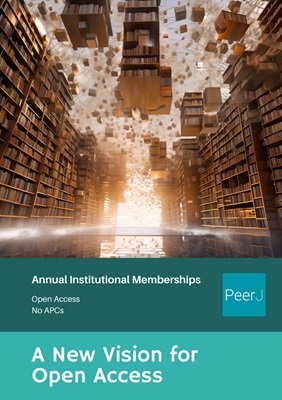PeerJ Revolutionizes Open-Access Publishing with Annual Institutional Memberships
Open-Access publishing advances global scholarship by making research results more widely accessible to anyone with internet access. However, publishers of Open Access journals have struggled to find a financial model that works well for all parties. Now, a new model from PeerJ is rethinking that approach to remove barriers to choosing Open-Access.


Open-Access publishing advances global scholarship by making research results more widely accessible to anyone with internet access. However, publishers of Open-Access journals have struggled to find a financial model that works well for all parties involved in research communication.
The most common approach is for Open-Access journals to charge what are known as APCs (Article Processing Charges) to cover the costs of publishing, including editing, peer review management, hosting, and preservation. Instead of the subscription fees that libraries and journal readers traditionally have paid for access to research articles, APCs shift these publishing costs onto researchers and their institutions.
Since APCs have emerged, many people in the research community have expressed concerns that imposing a fee on researchers to publish their papers creates barriers to publishing. Even when a research funder or university covers these expenses, APCs add a significant layer of administration to the publishing process. Not only do researchers have to prepare their paper for publication, but they also must coordinate with their funder and/or their employer to figure out who will pay APCs and how these invoices will be managed.
Now, a new model from PeerJ—an innovative publisher of Open-Access scientific journals—is rethinking that approach in an attempt to remove barriers to choosing Open-Access.
As an alternative to APCs, PeerJ offers what it calls Annual Institutional Memberships (AIMs) to research universities. Participating institutions pay a single yearly fee that enables their faculty and researchers to publish an unlimited number of peer-reviewed articles in PeerJ’s journals.
“We’re looking to reimagine the future by bringing more equity to Open-Access publishing,” says PeerJ Director of Communities Nathaniel Gore. “Our new model reduces barriers by making it so that no author at a member institution has to worry about paying to publish their research, while also making it easier for libraries and institutions to administrate the costs of – and promote - Open-Access.”
A more equitable publishing model
A growing body of research suggests that APCs can discourage researchers with fewer resources from publishing their work in Open-Access journals. These findings highlight the need for alternative publishing models that are more equitable for the research community.
PeerJ, which launched in 2012 and is now owned by Taylor & Francis, has been experimenting with alternative funding models throughout its existence.
PeerJ offers a one-time lifetime membership to authors that allows them to publish in the platform’s journals for life. “We know this model can be complicated for people to understand, because all co-authors have to be members in order to publish,” Gore says.
 PeerJ previously allowed institutions to deposit money into a fund that affiliated researchers could draw down from as they published their work on the platform. However, this model was difficult for institutions to plan around, as the rate at which the fund was used would be inconsistent.
PeerJ previously allowed institutions to deposit money into a fund that affiliated researchers could draw down from as they published their work on the platform. However, this model was difficult for institutions to plan around, as the rate at which the fund was used would be inconsistent.
Annual Institutional Memberships aim to address these challenges. The uncapped nature of this model eliminates concerns that the funding will run out before supporting all of an institution’s publishing requirements.
A university’s annual membership fee is based on its history of publishing in PeerJ journals. “Our membership model means that that you’ll never pay more than if you had paid APCs for each article published,” Gore says, “and you are more than likely to pay less.”
If an institution’s researchers publish fewer articles than anticipated in a given year, the university will get a discount that it can apply toward its fee for the following year.
“Budgets are always tight, and libraries are looking for cost-effective publishing solutions with low administrative overheads,” Gore notes.
Easier to manage
Aside from making financial sense, AIMs also reduce the administrative burden on researchers and institutions.
“Faculty just want to push a button and submit their work. They don’t want to have to worry about article processing charges,” says Robin Sinn, director of collections and open strategies for the Iowa State University Library. With an Annual Institutional Membership to PeerJ, Sinn says the Open-Access publishing process “is now much more automated and seamless.”
Jesus Campos Garcia, research coordinator for Universidad Michoacana de San Nicolas de Hidalgo in Mexico, says his institution has had an annual membership to PeerJ since October 2023. “The administration process has been very friendly and easy to manage,” he says, “in addition to being affordable.” He believes the AIM model will reduce barriers to Open-Access publishing moving forward and as a result have renewed their membership for another year
Colleen Lyon, head of scholarly communications for the University of Texas at Austin, agrees. In September 2024, UT-Austin renewed its AIM with PeerJ for the same rate as the prior year.
“Having a flat rate for Open-Access publishing is exactly the kind of model we can get behind, because we can easily plan for it,” she observes.
Libraries and research universities can learn more about PeerJ’s innovative AIM model here.
SPONSORED BY
RELATED
ALREADY A SUBSCRIBER? LOG IN
We are currently offering this content for free. Sign up now to activate your personal profile, where you can save articles for future viewing










Add Comment :-
Comment Policy:
Comment should not be empty !!!